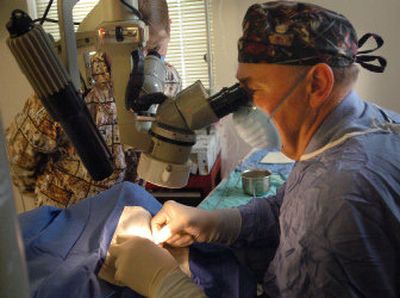Cataract surgery gives pets clearer vision

Bill Yakely and Wallace “Wally” James have a lot in common.
Both have light-colored hair. Both have a gentle demeanor. And both will have undergone cataract surgery by the middle of next week.
One big difference, though, is that Wally is a 2-foot-tall Welsh corgi and Yakely is his veterinary ophthalmologist.
Yakely has performed hundreds of cataract surgeries on animals, including Wally’s operation Wednesday. Next week, Yakely will have a cataract removed from his left eye, a year after a similar operation was done on his right eye.
“This is what you call the blind leading the blind,” said Walter Hutchinson, who traveled with Wally’s owner, Dawn Vallejo, from California to visit relatives and bring the dog for surgery.
Yakely’s eye problem is minor enough, however, that his ability to operate hasn’t been hindered, he said.
“If I was doing any other kind of work, I probably wouldn’t” have the surgery, Yakely said. “But if you let it go, that’s the problem.”
Vallejo, 81, adopted Wally four years ago, soon after her previous corgi was run over by a car.
“My daughter came up with this so we’d quit crying,” she said, pointing at Wally as he paced at Animal Eye Clinic of Spokane before the operation.
The animal lover has had eight dogs, six cats and a bird in her lifetime.
“If you had a mouse here, she’d cuddle up to it,” Hutchinson said about his friend.
So when Wally was diagnosed with diabetes last June, Vallejo didn’t think twice about shelling out $30 a month for insulin and the extra cost of high-quality dog food.
By July, the disease caused the dog’s eyes to fog over with cataracts.
A cataract is the clouding of the eye’s lens, the normally transparent disc that helps the eye focus.
It can be caused by age-related changes, heredity and diseases, including diabetes.
Cataracts are painless but make vision blurry, dim or distorted. They progress slowly in humans, but a dog’s eyes can quickly go from clear to cloudy.
On Wednesday morning, Wally’s eyes looked like an overcast summer sky.
“It’s like he’s looking through three or four layers of sheer curtains right now,” Yakely said.
The dog managed to weave between orange cones on an obstacle course, but he often walks into walls at home and has fallen onto the ice-covered swimming pool at Hutchinson’s children’s house in Spokane Valley.
Vallejo looked into surgery to correct Wally’s eyes in California, but she didn’t like the veterinary ophthalmologist in her area and he charged about $3,000.
When she and Hutchinson were in Spokane earlier this fall to build a playhouse for Hutchinson’s granddaughter, they found Yakely, who will charge between $1,600 and $2,000 for Wally’s surgery.
At the clinic Wednesday, another dog completed the obstacle course a day after its operation. Socks, a 17-year-old Shih Tzu-Pekingese mix, had been completely blind.
Socks’ owner, Bill Hill of Coeur d’Alene, said his teenage children complain that Hill spends too much money on the elderly dog.
“But he’s never given us the problems like you have,” Hill said he tells his children.
Wally’s surgery went well. After going under general anesthesia, Yakely propped open one eye at a time and pinned it into place to prevent it from rolling backward.
Using a needle-like instrument that vibrates at 30,000 pulses per second and sounds similar to a dentist’s drill, he entered the lenses and chipped away at each cataract until Wally’s eyes were brown again.
Three hours after his operation, wearing a plastic cone around his neck, a groggy Wally rode away in the back seat of Hutchinson’s Mercedes.
Most cataract surgery on humans is performed using the same technique Yakely uses on dogs.
Humans often are given a local or topical anesthetic and remain conscious, though.
Yakely, however, has chosen a doctor who will put him under general anesthesia during the surgery.
“I know what that machine is doing,” he said. “I don’t want to hear any noise.”
Looking ahead to his procedure next week, Yakely conjured up the image of another member of the animal kingdom.
“I guess I’m saying I’m chicken,” he said.